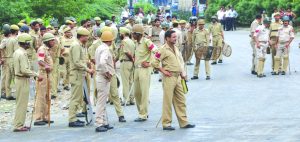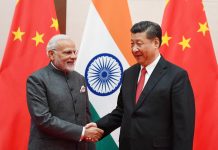
My name is Nawaz Ahmad Lone, resident of Kulgam. I was working as an SPO, I am resigning of my own free will, not because of any compulsion,” said one Special Police Officer (SPO) in a video which went viral in Kashmir ever since the militants killed three SPOs in South Kashmir district of Shopian. More such videos are doing rounds of the Valley’s social media space and this has created a crisis of great magnitude for the Jammu and Kashmir Police.
On September 21, around seven police personnel gathered at a mosque in Reshipora, Awantipora and declared their dissociation from the police. Their letters of resignations were that was read out by a preacher at the mosque. A total of 18 SPOs have declared their resignation from various platforms.
However, police was quick to deny that the policemen had resigned. The Director General of Police Dilbagh Singh, ADGP Muneer Khan and IG, Kashmir SP Pani have in their respective statements termed the videos as “propaganda” and asserted that the morale of J&K Police was high.
And, technically speaking, they were right. Public dissociation from the police isn’t same as officially quitting from the force and is unlikely to be accepted as resignation.
But this hardly detracts from the egregious security challenge at hand. The SPOs are adhoc police men who are paid a monthly salary of 6,000. Over the years they have assumed a lynchpin role in the state’s fight against militancy. According to an estimate there are more than 30,000 SPOs working in the state, 10,000 of whom were recruited in 2016 in the wake of the five month long unrest that led to the killing of around hundred persons and blinding of several hundred.
With militants targeting them and their families, the strategy seems to be to try and trigger desertions and deprive the state’s police force of their services. And a spate of declaration of resignations of the police men posted on social media underlines that the strategy has begun to pay off — albeit the impact so far is limited to South Kashmir, the hotbed of new age militancy.
Attacking the low-level police officials and their families followed in response to the alleged harassment of the militant families by the security forces. In August the police released 11 family members of Kashmiri militants in return for the militants freeing an equal number of relatives of policemen taken captive by them in revenge abductions.
Up until now as part of a tacit code, the militants and the police men didn’t harm each other’s families. But over the past year as the militancy gained more strength, both sides have revised this mutually accepted rule of engagement. Militants have justified the attacks on police men and their families as a retaliation to the police raids at their houses and those of their sympathisers.
Hizbul Mujahideen commander Riyaz Naikoo has warned the local police men that their families will be targeted if they continued to harass the families of militants. “Our families are only few hundreds in number, but yours are in thousands. We are ready to sacrifice in the way of our cause, so won’t be cowed down but what about you and your families,” Naikoo said in a recent video.
But, as a senior police officer said, the new militant tactics have blurred a red-line that has traditionally been respected by all the sides in the conflict so far, even by the pro-government militia Ikhwanul Muslimoon in the mid-nineties. The transgressions have been fewer and far between. For example, when in the nineties, the pro-government insurgents were killed by separatist militants, they would occasionally kill the members of their families in retaliation.
Police and the militants, on the other hand, would rather stay away from one another’s families, knowing well it was an arena where both were vulnerable. The rule has largely also been observed by the Army and the paramilitary forces. But no longer. This smudging of the redlines threatens to plunge the Valley deeper into turmoil. And the government by following an exclusively security centric approach is hardly helping the matters.
letters@tehelka.com













